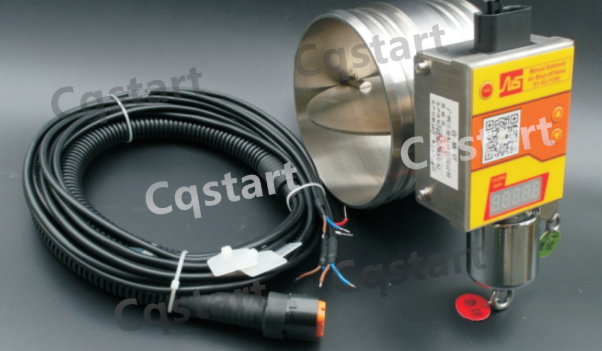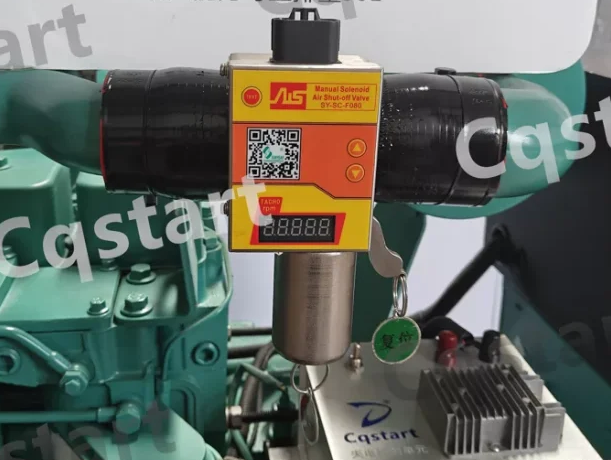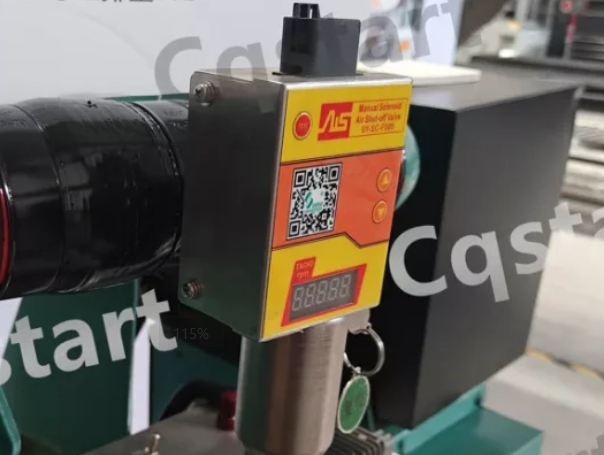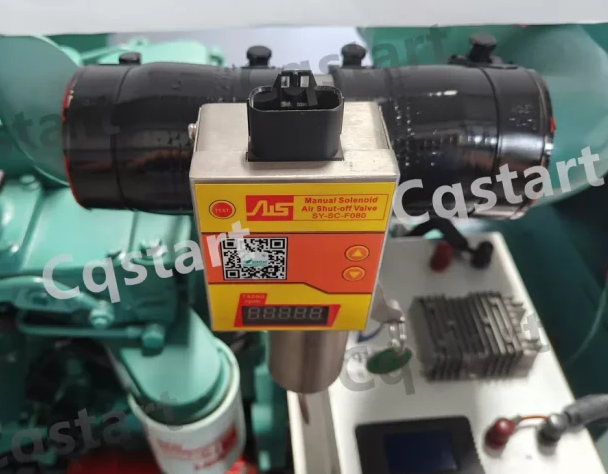In diesel engines and other industrial power equipment, air shut off valve is crucial from the point of view of safety. Not only does it facilitate instant engine air intake shutdown in emergency situations to prevent runaway operation, but is also a part of modern industrial safety systems.
In this article, we will give a complete analysis of the working principle, application conditions, installation and maintenance recommendations of air shut off valves is provided to allow you to gain a complete understanding of the necessary device.
Part 1. What is an Air Shut Off Valve?
An air shut off valve or an intake shut off valve is a safety control device which is mounted in the intake system of a diesel engine. It mainly serves to immediately shut off air supply as and when needed, which can permit emergency shutdown of the engine or can stop the working of the engine.
When a diesel engine experiences “engine runaway” such as swallowing flammable gases by mistake or running out of control because of self-ignition, the normal ignition or fuel system controls may become ineffective. In this case, an air shut off valve is a quick and easy solution by stopping the supply of air, thereby stopping the engine from running.

Part 2. Working Principle of an Air Shut Off Valve
The air shut-off valve is based on the principle of mechanically, pneumatically, or electronically shutting off the intake flow, effectively cutting off the air to the engine. By withholding oxygen supply to the engine, the engine is forced to stall so that runaway situations may be avoided. The device can respond rapidly and reliably in emergency states.
Manual Operation:
This form of control involves a physical motion from the operator, such as pulling a cable, pushing a lever, or turning a knob. It is often used whenever immediate manual action is in need.
Electronic Control:
The valve is embedded in the control system of the engine and can be fed electric signals to close remotely. This offers quick response from a central controller or shut-down system in safety-critical or automated systems.
Automatic Activation:
The valve may be connected to engine guard systems that monitor parameters such as overspeed, abnormal vibration, or higher than normal exhaust temperature. In case of abnormal conditions, the system will automatically trigger the shut off valve to prevent further damage.
The valve shuts tightly in seconds after it is activated, sealing the way for intake air. Without oxygen, there can be no burning in the engine, and hence, the engine is shut down. This process is especially critical for the protection of equipment and people, particularly where explosive gas or engine runaway hazard exists in the environment.

Part 3. Typical Applications of Air Shut Off Valves
Shut-off valves are a prevalent feature of equipment powered by diesel engines, where emergency shut down systems or safety protocols are needed. A wide range of industries employs valves for various applications as safety devices:
Generator Sets
In stand by or continuous power systems, especially those positioned in hazardous or confined spaces, an air shut off valve can instantly disable the engines in the event of an overspeed or fuel system malfunction. This prevents the uncontrolled running of the equipment which could dangerously lead to mechanical destruction or fire.
Mining Machinery & Drilling Rigs
Diesel engines used in underground mining as well as oil and gas well drilling are exposed to flammable gases. The possibility of an air shut off valve runaway in an engine of such mining and drilling equipment could dangerously set off explosive gases. Air shut off shut off valves provides engines with the opportunity to swiftly disable the engine air, thus preventing ignition.
Heavy-Duty Construction Equipment
Heavy construction equipment such as tractors, bulldozers, cranes and excavators cultivate close to explosive or dusty environments. The activation of air shut off valves provide the operators extra protection against equipment malfunction for the engine to be disabled the instantly while preventing fires.
Agricultural Machinery
Like any piece of agricultural machinery, tractors and harvesters are often located in dry and combustible environments (crop fields or grain elevators). Smoke diverters can provide an additional fire safety measure since the engine can be shut off immediately in the case of fire risk or abnormal operation of the engine.
With the inclusion of air shut off valves in such an application, operators as well as plant managers can prevent the possibility of engine runaway conditions and protect both human life and values of expensive equipment.

Part 4. Comparison of Different Types of Air Shut Off Valve
| Type | Control Method | Advantages | Disadvantages | Typical Applications |
| Manual | Pull cable / lever | Low cost, simple structure, simple to install | Needs human effort, slower response | General construction and farm equipment |
| Electronic | Electronic signal control | Remote triggering, fast response, easy integration | Dependent on electricity, more complex system | Intelligent diesel engines, generator sets |
| Pneumatic | Vacuum or air pressure driven | Extremely reliable, most appropriate for explosive or hazardous environments | Needs more complicated setup, higher maintenance needs | Oil & gas machinery, drilling rigs |
Extra Note:
- Manual valves are employed in rough environments where robustness and straightforwardness are essential, and where skilled labor is always present.
- Electronic valves are common in modern automatic systems so it is simple to interface with alarm systems, sensors, and control panels.
- Pneumatic valves are normally used in situations where electronic devices may pose a spark risk, delivering safer operation in flammable gas environments.
- Depending on operating conditions, level of risk, and plant equipment control infrastructure, the correct type of air shut off valve is to be chosen.
Part 5. Guidelines on How to Choose the Right Air Shut Off Valve
Proper choice of an air shut off valve is crucial in ensuring efficient engine protection and safe operation. Proper compatibility of the valve improves emergency response speed and reduces equipment failure threats. Below are the most critical factors to consider when making the choice:
Engine Type and Displacement
The valve must be properly sized to the airflow requirements of the engine. Engine size increases the need for larger capacity flow valves to effectively shut off air. Check manufacturer requirements for compatibility with your engine model at all times.
Control Method
Think about how the valve will be operated in your specific application:
- In equipment that is hand-controlled and is rarely left unattended with the operator, a manual valve may be sufficient.
- For offsite, automated, or hazardous circumstances, electronic or pneumatic control facilitates faster and more secure operation—usually automatically triggered by sensors or control systems.
Operating Environment
The operational environment directly affects the performance and durability of the valve:
- When under hot or dusty conditions, employ heat-resistant materials and corrosion protection.
- When under wet or marine environments, ensure that the valve is equipped with improved sealing and waterproofing features to avoid breakdown.
Safety Features
Evaluate if your application requires additional safety features such as:
- Fail-safe design to automatically close the valve even during a power failure.
- Adding emergency shutdown so that the valve can work in harmony with overspeed sensors, vibration monitors, or fire detection systems for automatic shutdown.
Always use air shut off valves that are certified by and from a trusted and renowned maker. High-quality valves provide longer lifespan, consistent performance, and better compatibility with various models of engines and types. Just ensure that the valve is a perfect fit in your existing engine control system or safety system.

Part 6. Installation and Maintenance Tips for Air Shut Off Valve
Proper installation and routine maintenance are required to maintain the consistent functioning of an air shut off valve. A poorly installed or un-maintained valve may malfunction at the worst of times, compromising engine safety. Here are doable tips that will help in maintaining peak performance:
Choose an Accessible Installation Location
Mount the valve in a manner that allows for easy access for hand operation, inspection, and maintenance. Manual or resettable types demand this particularly, where operators must have access to the valve in a hurry in the event of an emergency.
Supply Tight Sealing
In installation, check carefully the valve body and the sealing surfaces for airtight connections. Use correct gaskets or sealants so there will be no air leaks and influence the performance of the engine or weaken the shutoff mechanism effect.
Check Valve Responsiveness regularly
Develop a routine inspection routine to validate the valve’s responsiveness. Turn the valve manually or by means of control signals (as appropriate) to verify that it closes quickly and completely. Incompleteness or sluggishness may indicate wear or internal obstruction.
Keep Intake Area Clean
Keep intake path and valve inlet clean regularly to prevent dust, debris, or any other foreign matter from entering and interfere with valve operation. A clogged intake could prevent the valve from sealing properly or cause mechanical jamming.
Avoid Harsh Environmental Exposure
If the valve is being installed in a humid, salty, or corrosive atmosphere, use protective enclosures or corrosion-resistant materials. Exposure to such conditions for extended periods can corrode the valve housing, seals, or actuators and cause the valve to malfunction.
Final Thoughts
Though small, the air shut off valve is a “lifeline” in case of emergencies. Whether mining operations, oil wells, or regular construction work, choosing a quality, properly matched air shut off valve is not just an investment in protecting your equipment but also an investment in your operators’ safety.
If you need a trustworthy air shut off valve, Cqstart is a air shut off valve manufacturer you can rely on. With extensive experience in producing quality safety valves, Cqstart provides long-lasting products guaranteed to work perfectly even under the toughest conditions. Selecting Cqstart is selecting utmost protection for your engines and ultimate peace of mind for your business.

